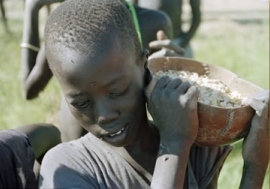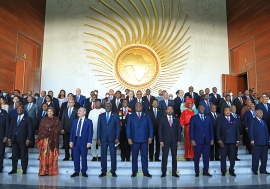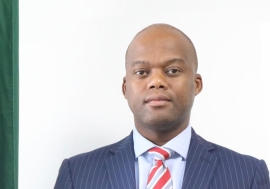Darfur: an experiment in African peacekeeping
Darfur: an experiment in African peacekeeping
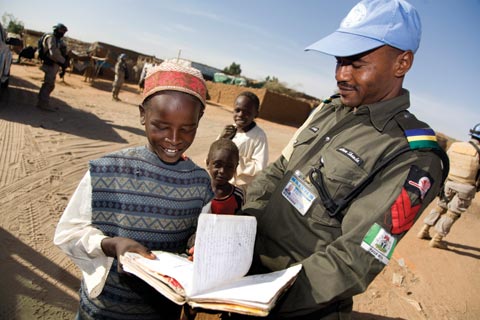 UNAMID officer from Nigeria looks over a student's school work at a North Darfur camp for displaced people.
UNAMID officer from Nigeria looks over a student's school work at a North Darfur camp for displaced people.When people discuss hybrids they are usually talking about the improved seeds favoured by farmers or about cars that combine petrol engines with large batteries for better fuel economy. But in the war-ravaged Darfur region of western Sudan, the UN and the African Union (AU) are testing a different kind of hybrid. That experiment, the African Union–UN Hybrid Operation in Darfur (UNAMID), is a 26,000-strong peacekeeping force deployed and commanded jointly by the UN and the AU, the pan-African political organization, to protect civilians and support a shaky peace process.
Whether UNAMID can succeed is the question. The Darfur mission marks the first time in the UN's 60-year history that command of a peacekeeping operation has been shared with another international body. The unprecedented arrangement is a product of dire necessity, created only after the Sudanese government rejected proposals for a standard UN mission. Even then authorities only reluctantly approved the joint operation, which replaced a previous, but weaker AU force, following assurances that the new mission would retain an "African character." The UN Department of Peacekeeping Operations provides logistical support for the mission in cooperation with the AU Peace and Security Directorate.
Since its deployment in late 2007 the mission has been hampered by shortages of personnel and a lack of aircraft and other equipment, much of which must be contributed by donor countries. The mission has also been the target of attacks on its staff and vehicles, and has been hamstrung by official restrictions on its movements in the vast region. Critics charge that despite some degree of success, the force has never been supplied with the military capacity and political backing needed to adequately protect the civilian population and support humanitarian efforts. Yet the mission, they argue, still absorbs significant resources, at a current annual budget of $1.8 bn.
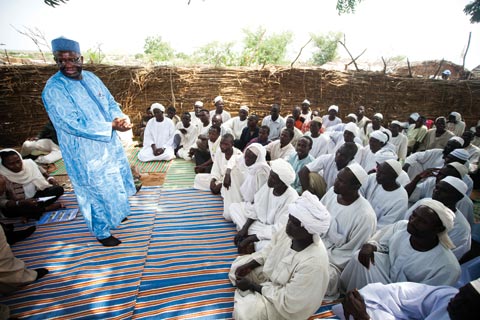 Ibrahim Gambari, head of joint African Union-UN mission in Darfur, meeting with elders at a camp for displaced people: Africans want a bigger role in designing and carrying out peace operations in Africa.
Ibrahim Gambari, head of joint African Union-UN mission in Darfur, meeting with elders at a camp for displaced people: Africans want a bigger role in designing and carrying out peace operations in Africa.Difficult circumstances
The most intense fighting in Darfur began in 2003 with clashes between local rebel groups and Sudanese government forces supported by a pro-Khartoum militia known as the Janjaweed. Atrocities, including attacks on civilians and mass rapes, have been common. The UN estimates that 300,000 Darfuris have died and more than 2 million are internally displaced. An additional 250,000 people have fled into neighbouring Chad.
The head of UNAMID, the AU-UN joint special representative for Darfur, Ibrahim Gambari, told Africa Renewal that after signs of progress in 2009, violence and instability are again on the rise (see Darfur: another tough job for Ibrahim Gambari). Despite the challenges facing UNAMID, Mr. Gambari believes that such hybrid operations can work.
"It wasn't designed right from the start to be a hybrid," he points out. "It was just circumstance that pulled it in that direction" — referring to the Khartoum government's objections to a solely UN presence. "Because the government of Sudan was not comfortable with a pure UN peacekeeping force, the Africans stepped in" in 2004 with an AU force that eventually totalled about 7,000 troops.
"What the Africans lack is not the will to serve, but the logistics as well as the financial support for peace missions," Mr. Gambari continues. "The international community committed enormous resources to support the African mission," and laid the foundations for UNAMID's structure as a largely African force supplied and financed by the UN.
Practical cooperation
UNAMID has now "been in business" for more than two years, Mr. Gambari notes. "And with all the challenges I think we've found it extremely useful" in strengthening practical cooperation between African and UN peacekeeping operations. "Sadly, I think Africa will continue to require international support for peacekeeping. The Africans themselves are now asking to be partners in the design, execution and implementation of peacekeeping operations. I will do my best to implement the resolutions of the Security Council and the wishes of the AU so that this is regarded as a model for the future."
Greater African involvement in the planning and execution of peace operations also brings political dividends, Mr. Gambari argues. "If you're an African country, this will tie you more into committing to it…. Plus it will be difficult for an African government to kick out a mission that is authorized by both the AU and the UN," noting that the continued presence of UN peacekeepers in Chad and the Democratic Republic of the Congo has been questioned by those governments.
Verdict uncertain
For some analysts, however, the jury is still out on whether the potential benefits of hybrid missions outweigh the complexities that can come from divided lines of authority and added layers of bureaucracy.
Alison Giffen, the deputy director of a US thinktank, the Henry L. Stimson Centre's Future of Peace Operations programme in Washington DC, told Africa Renewal that both the UN and the AU had learned valuable lessons in tactical and logistical cooperation from UNAMID. The experience has also strengthened Africa's ability to manage and deploy peace forces. "But at this point I would say that UNAMID is still producing more 'lessons learned' than 'best practices.'"
Despite a commanding African role in the Darfur operation, she notes, the Sudanese government still imposes arbitrary restrictions on the movement of UNAMID personnel, delays supply shipments and creates other obstacles. "The government has been good at playing the UN and the AU off of one another," she says.
The fact that the mission remains underequipped and below strength underscores another potential weakness of the hybrid model: excessive reliance on troops from very poor countries. "African troops generally are good troops," Ms. Giffen explains. "But they lack the equipment, logistics and training to deploy effectively into difficult conditions like those in Darfur. And the international community has been very slow to step into those gaps."
Ms. Giffen also notes that planning for another innovative approach to peacekeeping in Africa, a rapid deployment African Standby Force under sole AU command, is entering an advanced stage, with three of the five envisaged brigades nearing operational readiness. This means that Africa is developing a range of options for peace operations, from traditional UN missions to hybrids and interventions by subregional groups such as the Economic Community of West African States.
For Mr. Gambari, the challenge is to demonstrate to the sceptics that hybrids can work. "We still have to prove that UNAMID is indeed a much better model than pure UN peacekeeping operations," he acknowledges. "I like to think it is. We are working very hard to make sure that it achieves its mission."














